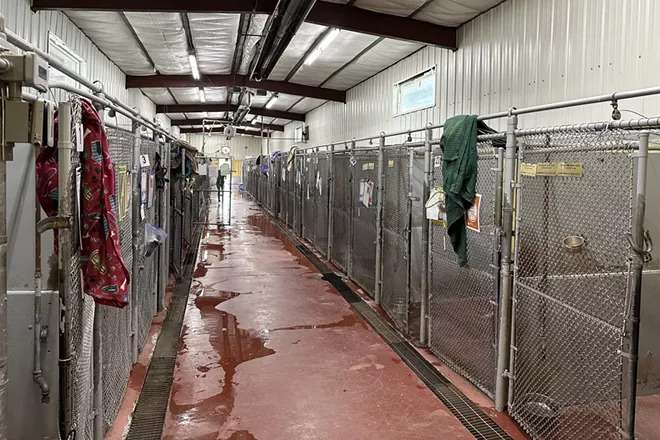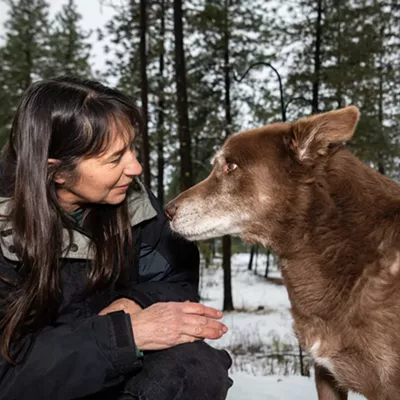
For the last year and a half, new leadership at Spokane Humane Society has changed how the nonprofit animal shelter operates, trying to stabilize the institution after years of turnover. But change isn't easy.
Last week, tensions between paid executives and some of the shelter's unpaid volunteers hit a breaking point. Sixteen volunteers walked out. In a joint resignation letter, they said "the hostile, adversarial treatment of volunteers by the current administration is our sole reason for leaving."
The volunteers' concerns vary. Some dislike a new "chain of command" structure that prevents volunteers from reaching out to specific staff members, and say they've been reprimanded for repeatedly asking about needed kennel repairs. They say a lack of coordination prevents every dog from getting a meaningful walk (above a brief potty break) every single day. Some worry about a lack of training for new volunteers and disagree with the shelter's use of behavioral tools such as prong collars.
Those who quit, including several very active dog walkers, met with leadership repeatedly in recent months. They sent a petition to the staff in March asking for the reinstatement of Phillip Broadbent, a volunteer widely respected for his ability to work with difficult dogs and new volunteers, and who also regularly voiced his concerns. After the shelter dismissed Broadbent in February, others felt they could also get fired for speaking up.
Humane society administrators say the nonprofit is going through growing pains as Kim Reasoner-Morin — the society's executive director who started in September 2021 and previously worked for Morning Star Boys' Ranch and Bozzi Media — and her team implement a new "Entrepreneurial Operating System." They note the resignations represent a small portion of their more than 300 volunteers, and say none of those who quit filed formal grievances.
"There was a lot of turnover of executive directors and leadership members in the last several years, and that's an issue that destabilizes an organization," says Briana Berner, director of development for the society. "We're very grateful for a lot of the things that [the volunteers] did during that time. But there also comes a time where the realities of stabilizing and restructuring an organization mean that we're going to retake control of certain things."
Brenda Wright, a long-standing volunteer who resigned, served under several executive directors and worked with thousands of volunteers. She says the new leadership has created an uncomfortable, depressing environment.
"This is the worst climate I've ever seen. It's like a black cloud has opened up," Wright says. "There's a lack of appreciation and respect for volunteers. ... They just want us to walk dogs and go home."
TIME OUTSIDE & SCHEDULING
The society had $2.7 million in expenses and more than $3 million in income in 2021, the most recent year figures were available. Its 46 paid staff include veterinary medical staff, kennel techs, paid dog walkers and administration.
Not including foster animals, the shelter averages 228 dogs and 196 cats in its care, according to staff, with 98 dogs and 82 cats adopted out each month. The shelter does not euthanize animals for long stays or lack of space, and more than 98 percent of animals that go to the shelter are saved. The rare euthanizations involve severe medical or behavioral issues.
The nonprofit relies on volunteers to help care for animals. Dog walks take about 20 minutes, meaning a single volunteer can take three dogs out per hour. Knowing that, volunteers developed playgroups to help get more animals out at a time.
"I'd put in three or four hour shifts and still leave a lot of dogs in the kennel not walked," says Yvonne Higgins Leach, one of the volunteers who resigned. "It really bothered me."
So, four years ago, she applied for a grant and received training to lead a program called Dogs Playing For Life. Under that model, four or more volunteers equipped with tools like air horns and treats can take out 14 dogs at a time. Since 2019, they've led the program at the shelter up to four days a week, enabling dozens of dogs per shift to make friends and get more intense exercise, Higgins Leach says.
"They're now starting to clamp down on this program in particular, with more rules and mandates," Higgins Leach says. She'll soon be leading that program at SpokAnimal instead.
Volunteers report any incidents between the dogs or between dogs and humans. Staff say that several dogs have been injured during playgroups and not every injury has been adequately reported, sometimes resulting in emergency vet visits.
Mindy Hayes, who helped lead Dogs Playing For Life before joining in the resignation letter, says that volunteers don't feel staff work with them to communicate when an animal can no longer go out with the playgroup, needs a muzzle, or gets restricted to only staff for walks.
"Critical changes were typically communicated through a game of telephone," Hayes says. "It's clear that we're not working together."
Some recent restrictions were made due to insurance liability concerns. After someone was severely bitten, volunteers were told they could no longer enter kennels alone to work with fearful dogs.
Even with playgroups and paid dog walkers, not every dog gets out for enough time, something that fired volunteer Broadbent repeatedly brought to staff attention.
"There's nothing worse than being a volunteer, you work the kennel and get out five dogs, 10 dogs, 20 dogs, and it's time for you to go, and there are still dogs that didn't get out," Broadbent says. "Those dogs stay with you all night."
Broadbent, who started volunteering in late 2016, advocated for an organized volunteer schedule to ensure each animal gets quality time outside. He also created a program in 2018 to mentor new volunteers who typically don't have staff to guide them after they finish orientation.
Staff say they parted ways with Broadbent for swearing at them, interfering with operations, and displaying aggressive and threatening behavior. Broadbent says he was not officially given a reason for his dismissal.

COMMUNICATION BREAKDOWN
Dozens of volunteers who did not resign have also met in recent weeks to discuss concerns about leadership. Broadbent says there's an overall lack of morale.
"It's not an enjoyable place to go to because management has become very authoritarian," Broadbent says.
The former volunteers say they have good relationships with many dedicated shelter staff members, and they worry some feel unable to speak up. Multiple current and former employees declined to go on the record for this article for fear of retaliation.
While previous administrations had an open door policy, volunteers feel like the current administration shuts people down and doesn't care about their other skills, says Wright, the longtime volunteer.
"We are an intelligent group of people with a wealth of experience and a lot of things to offer, and they're treating us like children," Wright says. "They've come right out and said, 'You do not need to share your opinions and information with us.'"
Administrators say that sometimes decisions need to be made that not everyone will understand or agree with.
"It's just not the role of a volunteer to make those decisions," says Ryan Rodriguez, manager of human resources and facilities. "A lot of us have been here less than a year, right? So we're really understanding our own role on top of creating structure to then provide support and feedback to the volunteers."
Several who resigned say there hasn't been a consistent volunteer coordinator in years, making it hard to follow a chain of command.
"They want us to establish a rapport with a volunteer coordinator to reach them," says Jeff Sandler, a volunteer who left. "In the one-and-a-half years I've been there, the current [volunteer coordinator] is the fifth one."
The new coordinator was hired in February, and staff say she's starting to take on scheduling and training, as volunteers have requested. Staff also say that at least one prior coordinator left due to intimidation from volunteers, and it took awhile to find the right person.
"What I'm hearing from that is, from both sides, there's the same goal. They're saying they want more structure," says Judie Wozniak, vice president of the nonprofit's board of directors. "It's not an easy position to fill, so it goes back to the time it takes to do that, to get the right person."
A lead volunteer also helps coordinate messages to and from staff.
Some volunteers like Freddie Bommer, who is a certified dog trainer, don't feel the organization allows them to fully use their skills. Bommer, who also quit, is a "force free" trainer with concerns about using prong collars for difficult dogs.
"My whole thing was, 'Let me help transition them off the prong collar,'" Bommer says. "Their argument was, 'No, these dogs need consistency.'"
Shelter Manager Sheena Bryant says that volunteers need to follow the staff's disciplinary structure, which is intended to save animals' lives. Only a handful of dogs at a time are on prong collars, she says.
"You can't bring in your own training style and go against our program style," says Reasoner-Morin, the executive director.
SHELTER STATUS
The shelter near Bigelow Gulch Road operates out of a 50-year-old building in need of repairs.
Volunteers have repeatedly asked staff to fix issues with the dog kennels, some of which have problematic latches, pieces of broken wire fencing, sharp edges on sheet metal dividers, and missing or broken grates above drains. Some dogs have cut themselves, and volunteers say they've been pinched or scraped.
Until a new shelter is built, volunteers say those fixes are needed as soon as possible, as the animals can't wait years for solutions. Rodriguez says staff have to prioritize maintenance requests, and things like clogged drains take priority over sticky latches. He says the shelter is in the process of putting covers over sharp metal corners.
A "Big Red Barn" on the property was renovated by the KXLY Extreme Team and a grant from Washington Trust Bank, opening in 2020 as a space to take dogs in inclement weather and hold volunteer gatherings. But staff say it was only used a few hours per week, and as administrative staff outgrow the trailer where they work, they're renovating the barn again to house their offices.
Some volunteers questioned using money for that renovation, as well as the board's choice to spend $250,000 on a new dog park in Riverfront Park, as they felt that money could be better used making animal enclosures safer. (The dog park funding is part of the $750,000 fundraising campaign run by the Spokane Parks Foundation. Ted McGregor, the Inlander's publisher, sits on the foundation's board.)
But board members says the dog park money ultimately came from a restricted donation that could only be used for the park, and staff say they're working through a list of repairs at the current facility.
"It is an old building, but once you start fixing things, you have to bring it up to code," says Heather Bafus, the shelter's finance manager. "Because nobody took care of the maintenance for years, everything is starting to fall apart now. So now we have to make choices." ♦

























